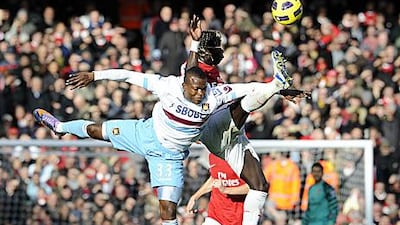On the morning of October 2, 2007, Victor Nsofor Obinna completed his practice session with his colleagues from Chievo.
The 20-year-old showered, dressed and got into the driving seat of his Audi. His destination was his home - towards the centre of nearby Verona in north east Italy - where he had moved to two years earlier to develop his career.
About halfway through his journey, near Bussolengo, is a part of the road notorious for accidents.
Chievo knew that only too well. There, a collision in 2002 cost the life of Jason Mayele, a young Congolese player of the Italian club. And now, about 100 metres from where Mayele had died, it almost happened again.
A Mini driving in the opposite direction from Obinna's Audi recklessly overtook another car. Obinna swerved to avoid a head-on collision.
Seconds later he came round. His vehicle was upside down, in a ditch by the road. The Mini was nowhere to be seen, fled.
Moments later, Aleandro Rosi, a colleague making a similar journey home, pulled over, fearing the worst. The club doctor soon arrived at the scene, to describe the appearance of a groggy but conscious Obinna as "a miracle".
He had suffered some bruising, but the winger-cum-striker would be back on the training field within a few days, and then help his team to promotion, a few months later, back to Serie A. Obinna recalls that day with relief and gratitude, as the watermark in a life that has known several various crossroads.
He was born in northern Nigeria, in the city of Jos, where a relatively high altitude may have been helpful to the stamina of an enthusiastic young athlete.
Obinna knew he was fast from a young age; his speed remains his most eye-catching asset. His first club was Plateau United, the local Jos heavyweights. He then moved south to Kwara United and from there to Enyimba, the then African club champions.
He had become a Nigerian international at 18 and caught the attention of scouts from European clubs even before then.
Inter Milan signed him, and, because their squad already had a full quota of non-EU players, loaned him to Chievo. There, he scored on his Serie A debut, and, by the following summer, the Verona club were asking Inter about extending Obinna's stay. They did, and though the next campaign ended in relegation, he remained for a third season.
In the summer of 2008, Jose Mourinho arrived as head coach of Inter. It appeared Obinna was on the threshold of a step up in his club career, but Mourinho had also signed two new wingers, Mancini and Ricardo Quaresma, and at centre-forward were Zlatan Ibrahimovic, Adriano and Mario Balotelli. Opportunities would be limited. Obinna had his moments, but chiefly he would be used as an impact substitute.
So the following August, he was off again on loan, this time to Spain's Primera Liga. At Malaga, he was to command a regular starting place and was installed in the starting XI for Nigeria when the World Cup began in June.
For 2010/11 Obinna played, and indeed shone, in pre-season matches with Inter, but by the end of August, he would be off to the Premier League, thus completing an unusual set for a 23-year-old: experience in each of the three leading leagues of Europe - Italy, Spain and England.
At West Ham United, his partnership with Freddie Piquionne, the French striker, has encouraged supporters to believe a gloomy start to the campaign may yet have a happy ending.
There remains evidence that Obinna lacks some cool and some steeliness as a finisher, but his speed and willingness to take on opponents may have found their most appropriate stage.


